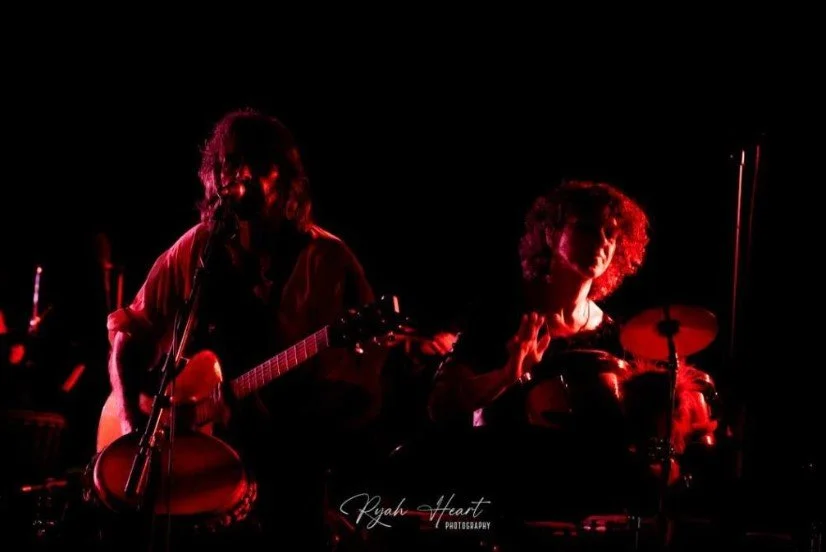The Magic Touch Of Tuatha Dea
Photo: Ryah Heart
“It took about six months to convince her it would be alright to sing in front of people”
Tuatha Dea, a genuine family band, is an image of that extinct traveling tribe of wonders with their assortment of hand drums, bagpipes and strings rolled into a patchwork of musical charm. It’s fronted by the harmonic vocals of two sisters fused with an energy that comes right out of old Appalachia with unique overtones atypical of modernity. This group of artists confidently display their refusal to be comfortable within categories, as the music constantly evolves & mixes primal rhythms with Appalachian style ballads and a touch of rock and roll.
It was a natural creation that became a way of life for the original founders, who eventually married. Danny Mullikin, long time drummer and multi talented musician, gave me some answers I’ve wondered about for a long time. Tuatha Dea has had many musicians come and go since they became active around 2010. The present, strong lineup includes Rebecca and Danny Mullikin, sister Katherine Holman and her husband, Chris Bush, Jeremiah Waldo, Brett Maney, and Samantha Jean.
CG: Danny, you met Rebecca at a highland festival on Grandfather Mountain by following her alluring voice as she sang by a fire. How long after this did you decide you were going to get her to front the band?
Danny: There was no band, no intention, no thought. The band basically grew out of Rebecca; not the other way around. We were just a drum group, not a band. It took about 6 months I think to convince her it would be alright to sing in front of people. There wasn’t a band… and then there was. It just— happened.
CG: How has that been?
Danny: It’s deepened the relationship and partnership to an incredible level. We’ve done it together, been part of its successes and failures. It’s been me and Becca against the universe.
CG: Do you guys have any special plans or ideas you're thinking about for next year?
Danny: We really want to get back into writing. We've already started the creative process, it's the part that I like the most. Making something out of nothing. We have several irons in the fire for new music and dropping singles seems to be the way of the world, so we'll give that a shot. Other than that, just business as usual and play where and when we can.
CG: Your tribal drum sound was originally responsible for getting people’s attention and drawing them out to live shows. How do you think this sustains your connection to the audience?
Danny: We say we we were born a drum circle— and we were. Even with the evolutions and changes over the years, we’ve tried to keep that present. The drum circle is communal. It naturally connects people with the basic concept of rhythm, and we try to keep the idea of audience participation alive, breaking the barrier between audience and band. I think it’s still a big part of the onion, but now dressed out with many other layers. The girls’ vocals are our bread and butter, but all the food groups are represented. Hopefully there’s something for everyone on the menu. (Food analogies. Lol!)
CG: Can you tell me a little bit about leading a drum circle, and how you guys have used drums to teach, or guide people towards collaborating and cooperating with each other?
Danny: I think it’s more about guiding than leading. And more about involving than teaching. If we do it right, it empowers the participants, then it becomes a community. Most of the time it will come naturally, and individuals will find the opportunity to express themselves while working within the framework of others. Any lessons are most likely subconscious but also obvious. It’s nonverbal communication. No mission statement is required because in the end, it breaks down all the barriers and allows people to engage one another based on their similarities rather than their differences. For a little while it makes for a perfect world.
CG: Was “Appalachia Burning” really written in a hotel room?
Danny: That’s a very good question! Yes and no. The melancholy minor key guitar parts have been bouncing around in my head since I was 17 years old with nowhere to grow. It was the first guitar piece I ever created, although it was certainly not perfected or complete. The words and melodies were all written and worked up between me and Rebecca in a hotel room in Pigeon Forge while we were evacuated, and the fires still smoldered on the mountains. It came together fast because it was honest. While the guitar riffs superseded the fires, the words, melodies, and harmonies, like the lyrics say, rose from the tragedy like a Phoenix.
Check out Tuatha Dea this month at the Central Kentucky Celtic Festival & Highland Games on the 16-17th, and again at the Bowling Green International Festival on the 30th.
Social Media:
Photography contributed by Ryah Heart Photo



